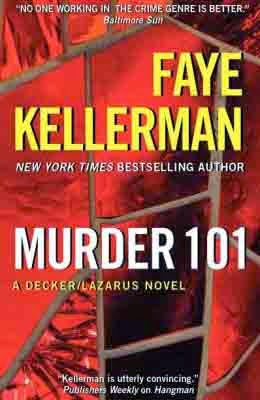
Moderating A Special Panel
by Jan Grape
Recently, I was contacted by Linda Aronovsky Cox who had been customer at my bookstore, Mysteries & More. Linda wondered if I would be willing to moderate a panel with Jonathan and Faye Kellerman and their son, Jesse for the Jewish Book Fair.
Wow, of course, I agreed while doing a happy dance. And was dancing even more once I knew it was to be an evening event, 7:00pm on Thursday, October 30, at the Jewish Community Center, in Austin. I'm a more coherent person in the afternoon and evening.
I had read several books by both Jonathan and Faye and met them around twenty years ago at a West Coast Bouchercon, but I didn't know their son, Jesse is also pursuing a writing career. The current situation is that Jonathan and Jesse have collaborated on their first book, A Golem In Hollywood, released in September. Jesse's books prior to this including Potboiler, an Edgar nomination for Best Novel. Faye's current mystery titled, Murder 101, released also in September.
 |
 |
 |
The big problem to lift it's head was the fact the event was nine days away and I had not read their books. and I live 60 miles one way from Linda and the closest Barnes and Noble is 30 miles one way. Linda and I chatted back and forth and decided even if she mailed the books to me, I might not get them in time to read. We decided I should order from Amazon and the book fair would reimburse me.
I got the books on Friday afternoon late and started reading Golem. This book is character and plot rich and complicated and five hundred fifty pages long. Needless to say, I knew I couldn't do a good job if I had not read this book. I mostly did nothing starting Friday evening thru shortly after midnight on Sunday except read. And I finished it. Good thing because it's not something like any previous book you might have read.
On Monday evening I began reading Murder 101 by Faye Kellerman. An advantage here is that I've read her before and this is again with her series characters, Rina Decker and Peter Lazarus. The new premise of this one is the couple have moved to Upstate New York, to a small college town. Peter has had a career of homicide detective for the Los Angeles Police Department, but now is working for the small town of Greenbury. There has been a break in at a Mausoleum that had windows made by Tiffany.
The captain in charge of GPD asked Peter Lazarus to assist in the investigation because he had more experience than anyone else on the small force. The GPD mainly handled traffic violations and domestic cases and college students drinking problems. Peter accepted reluctantly because he was paired with Tyler McAdams, a brash, rich, totally self-absorbed and obnoxious young man who had no idea how to talk to anyone or even to handle a gun.
Of course major mayhem occurred including murder and very involved art theft and taking Peter, Tyler and even Rina to New York, where she was able to visit with children and grandchildren, but also to accompany her husband and Tyler to art galleries since she had some knowledge in that field. Tyler did prove useful with his computer skills. I wasn't able to finish this book before the event, but knew enough that I could ask a couple of pertinent questions.
How to prepare for an panel with the famous authors in attendance? I'm mostly a fly-by-the-seat-of-my-pants moderator. Maybe it's my childhood upbringing where my creativity wasn't stifled along with the fact that I've probably moderated twenty-five or more panels and been a guest author on another twenty or so. The main focus for the moderator is to highlight the authors on the panel. They want to talk about their book or books. They are hoping they will tell the audience enough, intrigue them enough that people will rush to buy their book. There were over two hundred people in the audience and a lot of books were sold.
My friend Linda Cox introduced me and I in turn introduced the authors one by one calling them up to the stage as I did. The three Kellermans sat at a table, each had microphones and I had requested water for each. No one had thought to do that, but it's very important because with a lot of talking and a little bit of nerves your mouth and throat turns cottony rather quickly.
Once the guests were seated, I stood at a podium with a microphone. I briefly mentioned the Golem book and said as a previous bookseller I would classify it as a mystery/suspense/fantasy/thriller and Jonathan said and slash Romance. I did have to get a chair bought up to the stage as standing began to aggravate my back. Fortunately, my microphone was one that I could take off the mike stand. I also stood up when indicating another person had the floor to ask a question.
I also like to start things off with a laugh if possible so I said to Jonathan and Jesse, "What kind of whacky-tobacky were you two smoking when you wrote this?" It got the required laugh and we were off. Naturally they denied they had smoked anything and Jonathan began telling how the idea and the book came into being.
He had visited Prague a while back and had been intrigued by the Golem myth. Seems like everywhere he went he saw something about the Golem, even seeing a sign for Golem burgers. He researched a little more and got more intrigued but he had a couple of Alex Delaware (his series character) books in progress and didn't have time to work on anything new.
One evening he and Jesse were discussing the idea and Jon's enthusiasm was contagious. Jesse said you really ought to write this and Jonathan said, how would you like to write it with me. Jesse is a best selling author of five thrillers and is a renown playwright and Dad knew the son could handle it.
They both live in California but Jesse lives three hundred miles away with his own wife and son. So the father and son wrote back and forth using e-mails. The book contains a present day mystery and a jump back to the time of Cain and Abel from the Bible. The parts are sectioned off in the book so that you understand what time period you are reading about. I asked if Jonathan wrote the present day and Jesse the historical and they said "No." We both wrote it all together and tried to make it one voice and I assured them they had done an excellent job with that.
This book is quite different. The present day and the historical fantasy come together in the end. And Jonathan and Jesse are already working on a sequel titled A Golem In Paris.
I then talked with Faye about her book, Murder 101 and she explained how the Tyler character was really a pain in Peter's behind but she'd had so much fun writing that character. She wanted to breathe new life into the Lazarus's lives and make them fresh again.
After twenty minutes of just the Kellermans, I turned the floor over to the audience and we had about twenty minutes of "How do you and Faye write together?" They previously collaborated on two books. They have a big house and one works in one wing and one works in the other wing. They also used the email method of working together and it worked well. They just didn't do face to face reading or editing.
Someone wanted to know if they thought the writing gene could be hereditary? And all agreed there might be something to that. Jonathan said his father wrote stories and Jesse says his young son has a good imagination and tells a good story which the father has written down.
All in all this was a wonderful evening. All three Kellermans were entertaining, witty, knowledgeable, and fun to listen to. I really didn't have much to do, just sort of point them to how, when, why and they jumped right in and left the audience wanting to hear the "rest of the story" by purchasing their books.
I highly recommend both books and, from everything I've heard, I think the attendees really enjoyed the evening.
 |
| Kellermans: Jonathan, Jesse, Jan Grape, Faye |

















